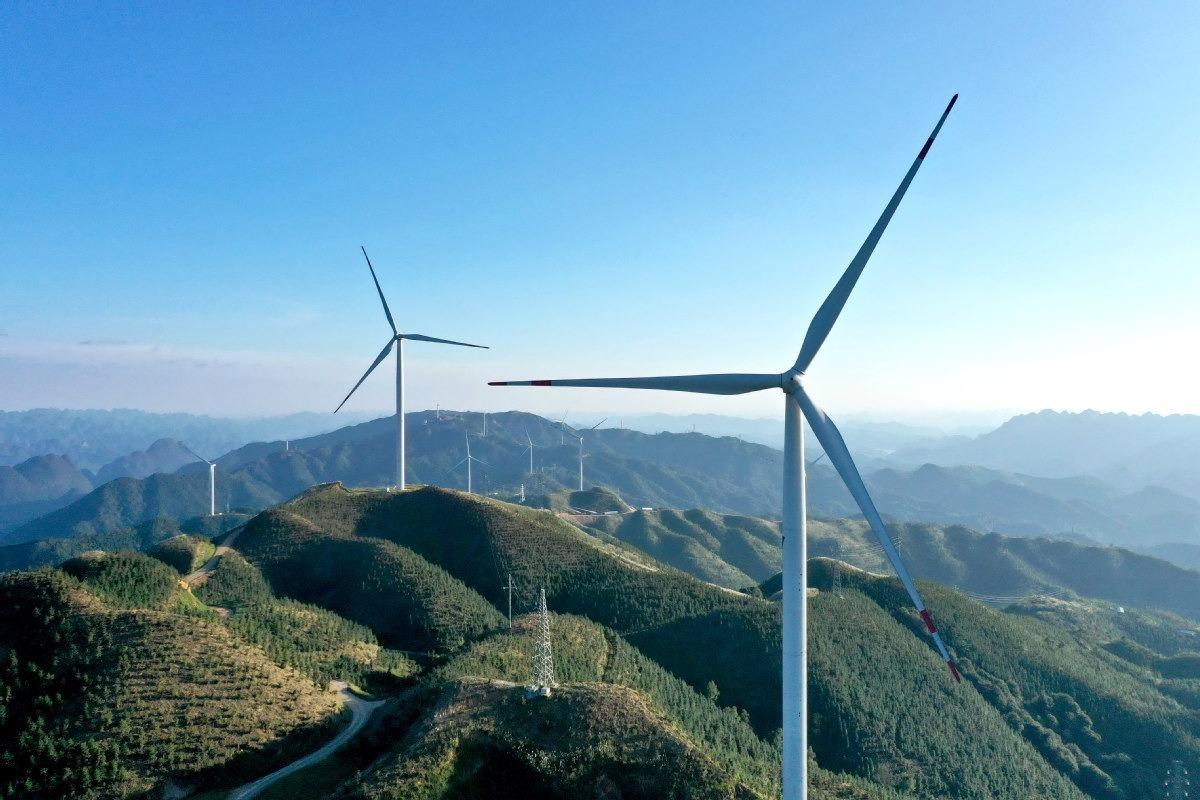Editor's note: Officials across the country are illustrating the Chinese approach to modernization at the local level.
 An aerial view of a wind farm in Liuzhou, Guangxi Zhuang autonomous region. (TAN KAIXING / FOR CHINA DAILY)
An aerial view of a wind farm in Liuzhou, Guangxi Zhuang autonomous region. (TAN KAIXING / FOR CHINA DAILY)
The Guangxi Zhuang autonomous region, a tourism destination famous for its karst landscapes, terraced slopes and the Lijiang River, as well as a border ethnic area, will continue to chart its path to modernization through green development, the region's top official said.
During the 20th National Congress of the Communist Party of China, Xi Jinping, general secretary of the CPC Central Committee, said at a group discussion on Oct 17 with delegates from Guangxi that Party committees and governments at all levels in the autonomous region should achieve greater progress in pursuing green development and strive to open up new prospects for building a magnificent Guangxi in the new era.
When Xi, who is also Chinese president and chairman of the Central Military Commission, inspected the region in April 2021, he said that "protecting mountains and waterways of Guangxi is the historical responsibility that we should shoulder".
Xi's instruction provides scientific guidance for promoting Guangxi's modernization with a focus on harmony between humanity and nature, said Liu Ning, Party secretary of Guangxi and a deputy to the 14th National People's Congress.
Liu said that Guangxi will implement the idea of green development in all processes and sectors of its economic and social development, protect mountains and rivers to maintain the ecological security of southern China, promote green transformation in all aspects and accelerate building a beautiful Guangxi and a pioneering region for ecological civilization.
The region has made significant progress in pollution prevention and control, as well as low-carbon transition and green transformation in recent years.
In 2022, Guangxi ranked second among all provincial-level regions in the national surface water assessment, with 98.2 percent of its surface water being of "fairly good quality", according to the regional Ecology and Environment Department.
The region also saw 94.5 percent of its water in offshore areas being rated "fairly good", again ranking second nationwide. Its ecological quality index and biodiversity richness were respectively ranked second and third last year. The region's share of days with good air quality stood at 95.1 percent, the eighth in the country.
Liuzhou, Guangxi's biggest industrial city, has led the national surface water assessment rankings among prefecture-level cities for three consecutive years since 2020. The city has more than 3,000 industrial companies and is also famous for luosifen, or river snail rice noodles.
Liuzhou used to be plagued by acid rain, and its dense network of rivers and lakes was dotted with sewage outlets, which turned the waters black and malodorous. Local authorities' persistent pollution control efforts and a strict water pollution governance system — involving intelligent digital monitoring tools and officials at all levels overseeing protection work — resulted in the drastic change.
Since 2011, the city has punished around 500 poorly managed polluting companies and completed clean transformation of 40 enterprises in key water-related industries. It has built 58 domestic sewage treatment plants and a 2,558-kilometer sewage collection network, with all industrial parks equipped with sewage treatment facilities.
Wei Yongxiang, director of Liuzhou's ecology and environment department, said the city works to balance economic and social development with high-level protection of water. Its path of prioritizing the environment and green development epitomizes Guangxi's ecological construction.
Liu, Party secretary of Guangxi, said a series of policies were released to tackle environmental issues. Officials have been asked to sign responsibility documents on ecological protection, release lists to define what should be done and what should be banned in ecological protection, and respond effectively to major environmental problems, he said.
"We will focus on ecological protection of major river basins, protect the Beibu Gulf and keep the mountains green, the waters clear and the air fresh," he said.
The region will also accelerate green transformation, develop the green economy, and drive innovation in green manufacturing programs and low-carbon technologies, he said, adding that great importance will be attached to green development of industrial, agricultural and service industries.
Contact the writers at chenmeiling@chinadaily.com.cn


